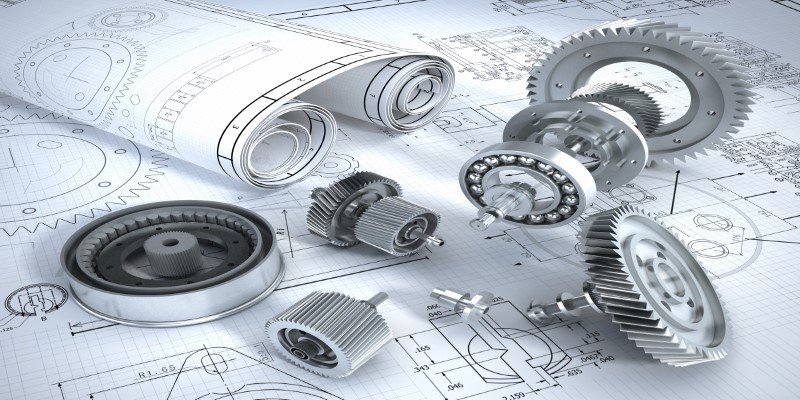
About Course
Basic Mechanical Engineering part 1
Mechanical engineering is the application of physical principles and the use of engineering tools to design, analyze, manufacture, and maintain mechanical systems. Mechanical engineering is one of the oldest branches of engineering, dating back to Ancient Greece and Rome. It is the branch of engineering that deals with the design, construction, operation, and maintenance of machines and mechanical equipment. Mechanical engineers use the principles of physics and mathematics to design, analyze, and manufacture mechanical systems. Mechanical engineers use a variety of tools, including computer-aided design (CAD) and computer-aided manufacturing (CAM) systems, to create and analyze designs. They also use finite element analysis (FEA) to study the behavior of structures and components under various loads. Mechanical engineers also use engineering materials such as metals, plastics, and composites to create components and structures. Mechanical engineers are involved in the design and manufacture of products such as automobiles, aircraft, medical devices, industrial machinery, and consumer products. They use their understanding of physics, mathematics, and engineering principles to create and analyze designs for these products. In addition, mechanical engineers are often involved in the testing and troubleshooting of mechanical systems, ensuring that the products they design and manufacture are safe and reliable. Mechanical engineers are also involved in the research and development of new technologies. They often collaborate with other engineers, scientists, and technicians to design and develop new products and processes. Mechanical engineers use their knowledge of mathematics and physics to create innovative solutions to complicated problems. In summary, mechanical engineering is a broad field that involves the design, manufacture, and maintenance of mechanical systems. Mechanical engineers use a variety of tools, including computer-aided design and computer-aided manufacturing systems, to create and analyze designs. They also use engineering materials such as metals, plastics, and composites to create components and structures. Mechanical engineers are involved in the design and manufacture of products such as automobiles, aircraft, medical devices, industrial machinery, and consumer products. They also use their knowledge of mathematics and physics to create innovative solutions to complicated problems.
Mechanical engineering is a branch of engineering that deals with the design, construction, and operation of machines and mechanical systems. It is a broad field that encompasses a variety of disciplines, from thermodynamics and manufacturing to robotics and composites. The core principles of mechanical engineering are based on the conservation of energy, the use of materials, and the application of forces. Mechanical engineers use physics and mathematics to analyze, design, and build machines and systems for various purposes, including energy production, transportation, and manufacturing. Mechanical engineers may work with a variety of materials, including metals, plastics, and composites. They are responsible for designing and developing the components of machines and mechanical systems. Common examples of mechanical engineering projects include the design of automobiles, aircraft, robots, and medical devices. The main objective of mechanical engineering is to develop and use machines and mechanical systems to improve the quality of life. This could include developing a new type of car engine, designing a new type of robot, or creating a new type of machine to manufacture products. Mechanical engineers are also responsible for the safety, reliability, and performance of the machines and systems they design. They must ensure that the systems they create are safe and efficient, and that they meet all applicable regulations. Mechanical engineering is an ever-changing field that is constantly evolving, as new technologies and materials become available. As such, mechanical engineers must keep up with the latest developments in their field. They must also be able to adapt to changing circumstances and be able to think critically and creatively when solving problems. Overall, mechanical engineering is a fascinating field that requires creativity and innovation. It is a field that requires a diverse set of skills, from mathematics and physics to engineering and design. Mechanical engineers are essential to the advancement of modern technology, and the future of mechanical engineering looks bright.
This course is a basic introductory course for all those who wish to learn technical concepts of Mechanical Engineering. Simple animations and basic definitions will enhance your learning experience. Simple concepts and different basic systems of mechanical engineering will be covered here. Animations and diagrams will increase your interests while learning. Basic systems in Automobile, Shafts, Bearings, Gears, etc. will be covered to give a realistic application-based feel of Mechanical Engineering.
Who this course is for:
- Anyone Who wants to Learn Engineering concepts. School As well As Engineering Students.
- Beginner Level for Mechanical Engineering.
Course Content
Basic Mechanical Engineering part 1
-
Important Thermodynamics Terminology, State, Process, Path, Cycle, Concept of Thermodynamics, BME
00:00 -
Zeroth law of thermodynamics (Basics, Applications & Limitations), Law of thermodynamics, statement
00:00 -
First law of thermodynamics (Basics, Applications & Limitations) / Basic Mechanical Engineering
00:00 -
Thermodynamic systems/ Open system/ Closed system/ Isolated system/ Types of system /Comparision
00:00 -
Types of Fuels / Solid fuels / Liquid fuels / Gaseous fuels / Fossil fuels / Classification of fuelsson
00:00 -
Types of solid fuels / Wood / Coal / Lignite / Wood charcoal / Coke / Peat / Briquette coal
00:00 -
Types of Liquid Fuels / fossil liquid fuels / fossil fuels / petrol / diesel / tar / kerosene
00:00 -
Types of gaseous fuels / fossil fuels / gas fuels / Natural gas / coal gas / advantages of gas fuels
00:00 -
Types of alternative fuels/CNG/LPG/Alternative fuels/Difference between CNG and LPG|CNG and LPG
00:00 -
Calorific value /LCV /HCV /Lower calorific value /Higher calorific value / CV /Basic Mechanical Engg
00:00 -
Hydel energy / Hydro power plant / Advantages / Principle / Hydel energy utilization
00:00 -
Solar energy, Principle of solar energy, solar electricity, Solar energy Applications, Solar power
00:00 -
Global warming, Global warming Principle, Causes of global warming, Effects of global warming
00:00 -
Ozone depletion/ How ozone depletion occurs ?/ Causes of ozone depletion/ Effects of ozone depletion
00:00 -
Steam formation/Enthalpy of steam/Temperature vs Enthalpy diagram for steam/Formation of steam
00:00 -
Types of steam/Dry saturated steam/Wet steam/Superheated steam/Saturated steam/Steam types/BME
00:00 -
Use of steam table/Types of Steam Table/Example solved by steam table/Format of steam table/BME
00:00 -
Important Equations of steam/Enthalpy of Steam/Enthalpy of Steam formula/Formula for Steam formation
00:00 -
Example on Steam table 1/How to use steam table/Steam formation problem/find value from steam tableon
00:00 -
Example on Steam table 2/How to use steam table/Steam formation problem/find value from steam table
00:00 -
Example on Steam table 3 / Steam table problems / Steam formation problem / how to use steam table
00:00 -
Example on Steam table 4 / Steam table problems / Steam formation problem / how to use steam table
00:00 -
Example on Steam table 5 / Steam table problems / Steam formation problem / how to use steam table
00:00 -
Example on Steam table 6 / Steam table problems / Steam formation problem / how to use steam tablesson
00:00 -
Barrel Calorimeter/Types, Working & Limitation of Barrel Calorimeter/Dryness fraction of steam/BME
00:00 -
Separating calorimeter, Working & Limitation of separating Calorimeter, Dryness fraction xn
00:00 -
Throttling calorimeter/Working of throttling Calorimeter/Animation of throttling calorimeter/BME
00:00 -
Boyle’s Law, Mariotte’s Law, Boyles law, Statement of Boyle’s law, Real examples of Boyle’s law
00:00 -
Charle’s Law /Charles law /Statement of Charle’s law /Real examples of Charle’s law
00:00 -
Combined gas law/Ideal gas equation/Characteristic gas equation/Gas constant/Universal gas constant
00:00 -
Cp – Cv = R, Specific heat with adiabatic index, Relation between specific heats, Mayer’s Equation
00:00 -
Isochoric Process, Constant volume process, Work done in constant volume process
00:00 -
Constant pressure process, Isobaric Process, Work done in constant pressure process, enthalpy change
00:00 -
Constant temperature process, Isothermal Process, Work done in constant temperature process, BME
00:00
